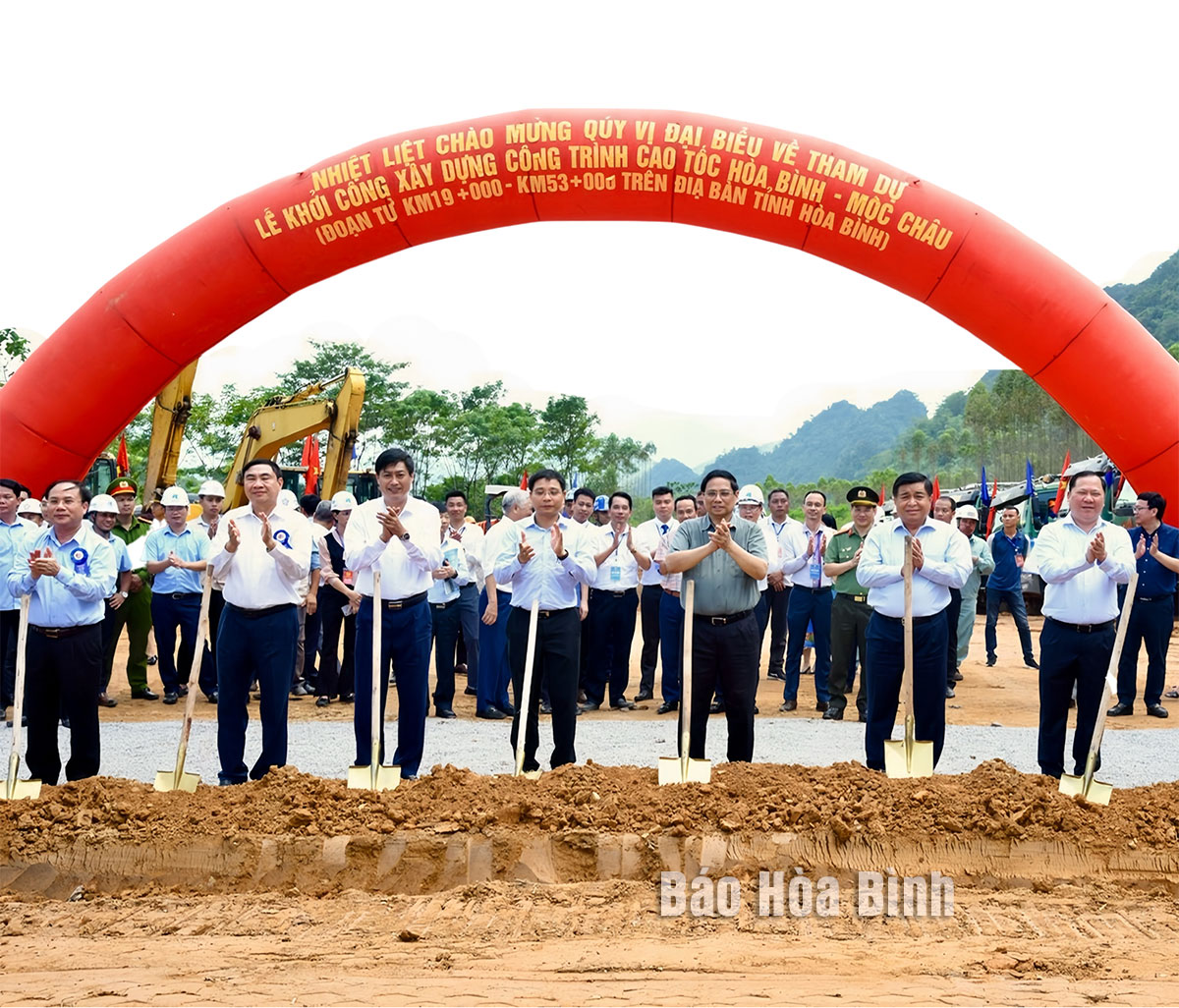



Prime Minister Pham Minh Chinh and other delegates attend the groundbreaking ceremony for the Hoa Binh – Moc Chau expressway project in the northern mountainous province of Hoa Binh on September 29.
The province’s economic growth reached nearly 9% in 2024, with a per capita income of 81 million VND (about 3,182 USD). State budget revenue exceeded 7.4 trillion VND, equivalent to 183.6% of the estimate assigned by the Prime Minister and 128.8% of the target set by the provincial People’s Council. The province earned over 2 billion USD from exports, a year-on-year increase of 20.7%, meeting 100.03% of the annual plan. Its import turnover increased by 12% over the previous year, hitting 1.3 million USD, equaling to 100.05% of the yearly plan.
In 2024, the province saw the establishment of 496 new enterprises with a total registered capital of 8.1 trillion VND. Thirteen investment projects received approval for both policy and investor selection while 12 others were granted investment registration certificates. The province also exported a variety of agricultural products to major markets such as the United Kingdom, the European Union, and the US.
A key milestone was the groundbreaking of the Hoa Binh–Moc Chau Expressway, a vital infrastructure project with an investment of over 10 trillion VND, designed to create transformative opportunities for the Northwest region. Another significant project was the construction of an electronic printed circuit board factory in Japan’s Meiko Electronics Co.Ltd in the Bo Trai Industrial Park. Spanning 9.2ha, the plant involves an initial investment of 200 million USD, which is expected to increase to 500 million USD with the completion of a second factory.
Beyond economic development, the province prioritised cultural, healthcare, educational, and social welfare advancements. Culture emerged as a vital internal strength, exemplified by the recognition of two archaeological sites— Mai da lang Vanh (Vanh Village Stone Roof) in Yen Phu commune and Hang Xom Trai (Trai stone cave in Tan Lap commune in Lac Son district in Tan Lap commune) —as special national relics. The revival of traditional cultural festivals further boosted tourism to the province. These socio-economic accomplishments in 2024 significantly contributed to the success of the Provincial Party Congress Resolution for the 2020–2025 term.
The province's achievements can be attributed to the strong and timely leadership of the provincial Party Committee, People’s Council, and People’s Committee, alongside the concerted efforts of the local residents and business community. Party Committees and authorities at all levels implemented four strategic breakthroughs on completing and enacting planning, advancing administrative reforms, developing human resources linked to job creation, and addressing land clearance challenges to expedite key projects. The provincial People’s Committee and its chairman assigned 145 specific tasks to various departments and devised four growth scenarios.
Additional measures included sustainable management of natural resources, environmental protection, and comprehensive socio-cultural development, improving both the material and spiritual well-being of residents.
Looking ahead, the provincial People’s Council has set ambitious targets for 2025. The province aims to achieve a gross regional domestic product (GRDP) growth rate of at least 9%, with GRDP per capita rising to 88 million VND. State budget revenue is expected to exceed 7 trillion VND, while export turnover is projected to surpass USD 2.3 billion. The urbanisation rate is set to reach 38%.
To realise these goals, the province will focus on key strategies, including promoting administrative reforms, enhancing governance efficiency, and streamlining administrative structures. Human resources development will be aligned with job creation and productivity improvement.
Agricultural restructuring will be advanced toward high-value, sustainable development, leveraging the Fourth Industrial Revolution. Collaboration in tourism will be expanded among the eight northwestern provinces and nationwide, with efforts to improve tourism services and create high-quality products.
The province will continue to attract investment by enhancing the business environment, managing natural resources sustainably, protecting the environment, and proactively responding to climate change. Balancing economic growth with socio-cultural development and social welfare remains a priority, with efforts to preserve and promote the province's unique cultural identity.